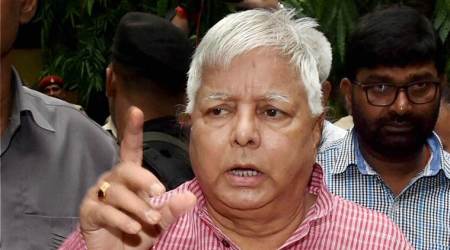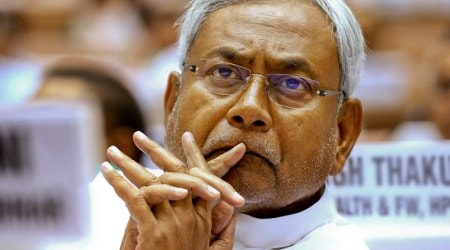 Terming his embrace of the BJP as the “victory of people’s desires”, it says that “Sushasan Babu” Nitish has been able to keep people’s hope afloat.
Terming his embrace of the BJP as the “victory of people’s desires”, it says that “Sushasan Babu” Nitish has been able to keep people’s hope afloat.
King without crown
Commenting on the recent developments in Bihar, the editorial in Panchjanya says Nitish Kumar has proved that one can remain the king even after one has taken his crown off. Terming his embrace of the BJP as the “victory of people’s desires”, it says that “Sushasan Babu” Nitish has been able to keep people’s hope afloat. Lalu Prasad had never thought anybody could sweep the carpet from under his feet. “Nitish was caught in an uncomfortable trap for the last twenty months,” it says, adding that it was expected he would soon get tired of carrying the load of the corrupt family.
There are three takeaways from this development. “The neo-rise of Nitish”, which has given him an important space among non-BJP leaders. He now stands ahead of the likes of Lalu, Mamata Banerjee, Rahul Gandhi, Navin Patnaik and Arvind Kejriwal. Second, it has brought politics to a new turn, which is expected to further intensify cleanliness in politics. The third and the most significant pointer is towards the 2019 elections. It marks the “next phase of social-political change” as the dream of B.R. Ambedkar, Ram Manohar Lohia and Deen Dayal Upadhyaya is now taking a concrete shape. Indian politics is now on the path to get freedom from casteism and dynasty politics.
Kovind as president
The cover story in Organiser says “the election of Ram Nath Kovind as President proves that caste is no bar to reach the highest office and it shows the strength of Indian democracy”. It notes that while some said “that he is the first BJP man elected for Raisina Hill”, he clearly stated that he “is the representative of deprived and downtrodden people of the country and his victory is a message to those discharging their duties with integrity”. The article traces his origins, including his childhood days in his ancestral village when he “lived in a kuchha house made of mud”.
Noting that “he is widely known as a kind-hearted” man, it adds that he is a “good parliamentarian, expert of the Constitution and a good administrator”. His tenure as Bihar governor “has been a landmark”. Underlining that “the significance of this Presidential election is multidimensional,” the report says Kovind “received 66 per cent votes” from across “each and every state of the country”. Even the non-NDA parties “supported him wholeheartedly”. His election also “gives a strong message to the whole world that there is a stable and strong government at the Centre in India and federalism is getting stronger under the leadership of PM Narendra Modi and in spite of political differences, Bharat is united on national issues”.
Deciphering China
Commenting on the domestic situation in China, an article in Organiser says “the internal reality in Communist China is not organised and healthy”. It “confronts” the “conventional perception” that “China is Dreamland” and undertakes a “social, political and military audit of China”. The country that boasts about “its Communist ethos”, is affected by “striking and shocking” “disparity”. A Chinese survey notes that “disparity in income, wealth and assets of households in China are getting increasingly severe with every passing day”.
The “most dangerous finding of the report is just one per cent of families possess about one-third of China’s total wealth, and 25 per cent of the households have only one per cent wealth,” it says. “As a result, people in rural China are losing faith in government and labour protests are becoming common, which has worried the Communist Party,” it notes. The article argues that “geographical financial inequality in China is more worrisome, which is likely to prove a potentially turbulent issue in near future”. While China’s “coastal region” is “industrially developed”, people in the hinterland are “miles away from prosperity”. “These people living in rural China were the backbone of Communist revolution in Mao’s era,” the article says.

